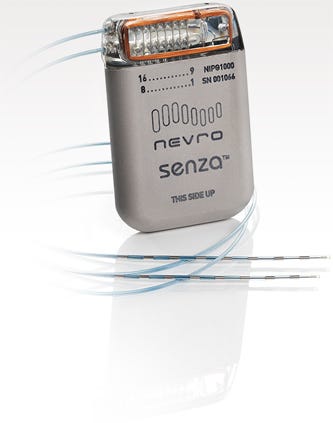Boston Scientific Challenges Startup's IP
May 18, 2015

On the heels of getting FDA approval for its unique neurostimulation device, the startup Nevro Corp. has learned that Boston Scientific officials are questioning the validity of a patent covering the device.
Brian Buntz
The startup Nevro Corp. managed to convince FDA that its Senza neurostimulation device is superior to older comparable technologies. A clinical trial sponsored by the company found that nearly nine out of 10 patients preferred the Senza device to a traditional spinal cord stimulator. One of the key selling points of the device is that it is designed to relieve chronic pain without triggering a tingling sensation known as paraesthesia.
Nevro has been aggressive in obtaining intellectual property for the device, which is now covered by 52 U.S. patents.
Boston Scientific, however, is questioning the validity of one of those: U.S. Patent No. 8,359,102 and has filed two petitions for inter partes review with the U.S. Patent and Trademark Office.
Filed in 2012, that patent relates to the use of high-frequency spinal cord modulation to relieve pain while curbing side effects. The patent was granted on January 22, 2013.
In somewhat related news, officials at Boston Scientific were apparently angered by the 2013 departure of Dongchul Lee, a biomedical systems engineer who is now Nevro's director of theoretical research.
Boston Scientific sued Lee for violating a confidentiality agreement and for theft of trade secrets, according to Law.com. Boston Scientific maintained that Lee had then turned those secrets over to officials at Nevro and the company filed a subpoena to obtain forensic images on two of Lee's work laptops.
Nevro moved to have the subpoena vacated and argued that the laptops had confidential trade secrets not relevant to the case and should therefore not be shared with Boston Scientific.
Last year, a California federal court sided with Nevro on the latter point, and Boston Scientific was not ultimately able to obtain data from either of the laptops mentioned in the case.
Learn more about medical device business at MD&M East. |
Brian Buntz is the editor-in-chief of MPMN and Qmed. Follow him on Twitter at @brian_buntz.
Like what you're reading? Subscribe to our daily e-newsletter.
About the Author(s)
You May Also Like


